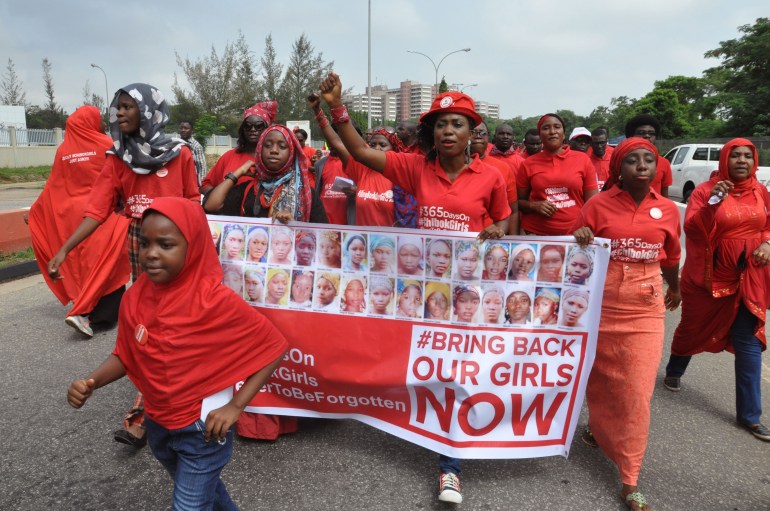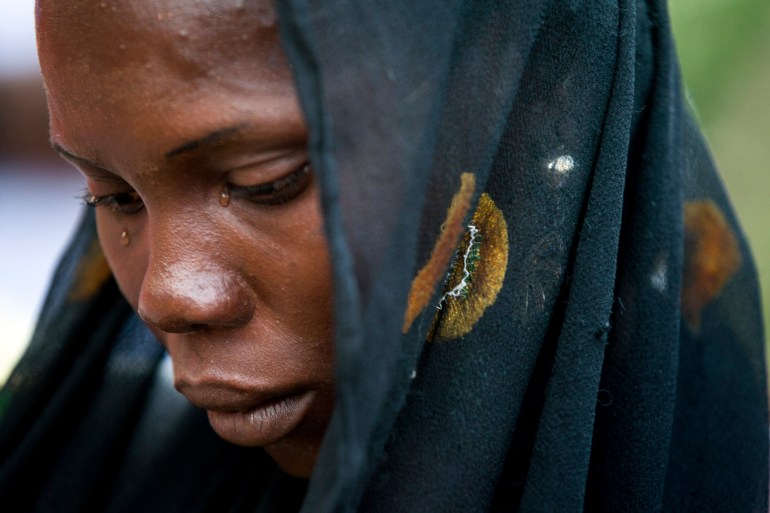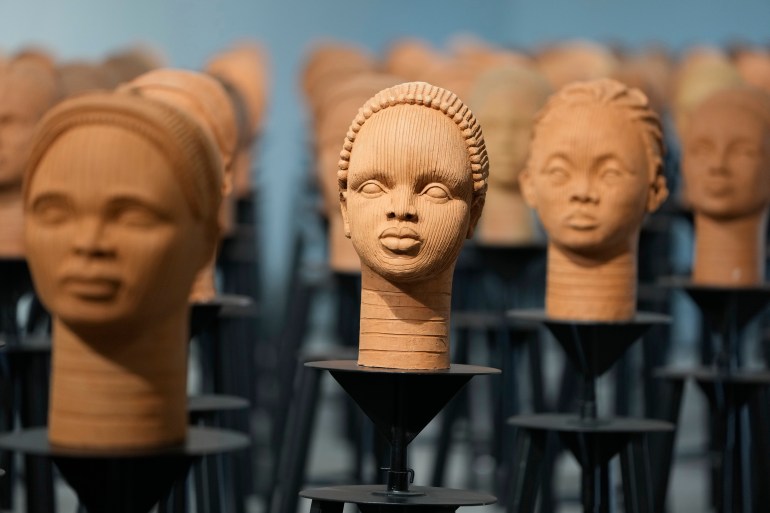Maiduguri, Nigeria – It has been almost a year since 26-year-old Rabiat left the Boko Haram enclave where she was held for almost a decade.
At her home in Maiduguri, the city in northeastern Nigeria that has been at the center of the armed group’s fighting for 15 years, the mother of three pondered life as a free woman.
Rabiat, whose name has been changed for her safety, was one of 276 girls abducted by Boko Haram militants from their school in Chibok town on the night of April 14, 2014. This was Nigeria’s most high-profile mass kidnapping case.
About 90 of them are still missing. Fifty-seven escaped when they were taken to the group’s base in the vast, ungoverned Sambisa forest, 60 km (40 miles) southeast of Maiduguri.
From 2016 to 2017, 108 were rescued by the Nigerian military or released through prisoner exchanges, while about 20 more, including Rabiat, returned in the last two years.
Like many others who escaped the harrowing conditions of Boko Haram’s hideouts, the girls-turned-women now face a very different challenge: the struggle to restart their lives even though so much has changed.
Rabiat was a Christian teenager when she was kidnapped. She was forced to become a Muslim and married, first to one fighter and then to another. She too was forced to become a mother: her son is seven, her daughters are five and two years old.
When the leadership of the Boko Haram faction that held her captive collapsed last year and she was presented with an opportunity to leave the forest, Rabiat seized it and surrendered to the Nigerian army.
“I left because Boko Haram was struggling and fighting [with each other]”,” she said in her native Hausa, explaining how some hostages used this as a chance to escape captivity.
Like others linked to the armed group, she completed a three-month “deradicalization program” at Bullumkutu camp, one of three sites in Maiduguri where thousands are taught social values and vocational skills such as sewing. Around 150,000 “repentant” Boko Haram members who have surrendered to the army are also taking part in the program.
Rabiat was then moved to a large compound in a wealthy area of Maiduguri with more than a dozen other so-called Chibok girls. The women are monitored, their every move is monitored – probably due to the specific nature of their case. In addition to their accommodation, the Borno state government pays them a monthly stipend of 30,000 naira ($24) and has promised them a home of their own.
However, returning to normal life was difficult, Rabiat said.
“Some days people insult us. They call my children “children of Boko Haram”. It’s so painful. My heart can’t take it.”
It’s difficult to ignore the negative comments – sometimes from the administrators who run the site or from people who live in the neighborhood, she said.
Fatima Abubakar, country director of Search For Common Ground (SFCG), a nonprofit organization that provides psychosocial support to women and children previously held hostage by Boko Haram, said such responses can cause lasting psychological damage.
“I worry about what this will mean for the children,” Abubakar said. “I am a mother of three myself and know how positive and negative reinforcement affects children. These reactions cause children to question the adults around them and begin to live in their minds.
“We need to make sure the atmosphere is not negative for them.”
The target group is at-risk school children
The Chibok abduction was not the first Boko Haram attack on students in Nigeria, but it was the first mass abduction of school children, and the reaction across the country was horrified.
A global backlash also followed as thousands of people around the world, including then First Lady of the United States Michelle Obama, protested as part of the #BringBackOurGirls movement. Much anger was directed at the Nigerian government of former President Goodluck Jonathan, which was seen as too slow to react in the immediate aftermath of the kidnapping.

Boko Haram, which wants to establish a caliphate in northeastern Nigeria, is particularly opposed to Western education, especially for girls and women. The name can be loosely translated as “education is sin”.
The abduction of the Chibok girls, aged 16 to 18, laid the foundation for the ongoing epidemic of school abductions in Nigeria. More than 1,400 children were kidnapped in a decade.
The power struggles between Boko Haram and a breakaway group, the Islamic State of West Africa Province, have weakened the group.
When Boko Haram leader Abubakar Shekau was killed in 2021, thousands of his fighters were forced to surrender to the Nigerian army and a Borno government keen to expand a “reconciliation and reintegration program” supposedly bringing lasting peace would.
About a third of the missing Chibok students are believed to have died in captivity. Many defiant hostages who refused to be married to Boko Haram fighters are believed to have been forced into sexual slavery or domestic servitude or used as suicide bombers.
The Nigerian government has largely moved on, grappling with competing problems, including the abduction of thousands of other women and children also abducted by armed factions or criminal groups in northern Nigeria.
Parents of missing women are filled with grief
Some parents of the missing still hold out hope that their daughters will one day return, others have given up.
“Over 30 of them are dead,” said Ayuba Alamson, a spokesman for the parents, citing a figure that does not include 11 people killed in Boko Haram attacks in November 2014.

Alamson’s ward – Hadiza Kwakii, the daughter of a deceased sister – was among those who fled Chibok the month after her capture.
However, Alamson said that for those whose children have not returned, the grief is pervasive.
“They died because of it. Many of them are still affected by trauma and fear and life is bitter and frustrating. We call on the Nigerian government to do its best to free all remaining girls,” he said.
For parents in predominantly Christian Chibok whose children have returned, there is a loss of a different kind.
Last year, Rabiat had a heated argument with them after visiting her parents for the first time since escaping captivity. Her father, she said, was so angry that she had chosen to remain Muslim that he cut her off.
“I don’t want to leave Islam. I would rather die,” she said.
Her decision to remain married to the Boko Haram commander who persuaded her to leave the group’s forest hideouts and surrender to the army has also angered her parents.
“We love each other and he is good to me,” said Rabiat, who is pregnant with her fourth child.
She was forced to marry the commander nine years ago, about a year after her abduction. Although he is currently undergoing a lengthy “de-radicalization program,” he visits Rabiat frequently.
“People expect us to leave our husbands and choose another man after giving birth to three children, some even four? We don’t see this as a good thing for us,” she said.

Not the same girls who were kidnapped
Several returned women who were also forced to marry fighters echoed Rabiat’s sentiments in local media reports.
SFCG’s Abubakar says it is not uncommon for former hostages to reject separation from the lives they have led for years. She said Boko Haram fighters had given women a different reality over the years and it would not be easy to undo that.
“That’s not likely [these women] Maybe the same people they once were won’t come back. It is an absolute must,” Abubakar said, noting that the need to survive during their captivity could increase the hostages’ willingness to accept alternative narratives.
“These men gave them a false impression of security. They make them believe that they are honorable women serving honorable men, but the trauma of what happened only dawns later – when the community tells them that what happened to them was terrible when they say, that their children have bad blood.
“We need to be compassionate and give [the women] It’s time to figure out what path they want to take going forward,” she said.
Some parents blame the Borno government in part for the “indoctrination” of their daughters.
A group of about 16 returned Chibok students were assigned the same living quarters as their struggling husbands, suggesting authorities approve of their unions and disapprove of their parents, Alamson said.
Furthermore, the spokesman added, the Borno government should have enrolled the women in formal schools instead of giving them informal vocational training and leaving them idle. Although some of the women have told him they would not return to Western education, there are alternatives, he said.
“If they end up just doing skills training, then that’s the main purpose [of their freedom] is defeated,” Alamson claimed. “There are institutions where they can study and become professors of true Islam. Let the government send them there.”
The differences between what freed women want for themselves and what their parents want for them are exacerbated by authorities largely assuming what they want, Abubakar said.
“I understand the need to make up for all the lost years, but we may not be providing what each individual needs. We need to know what their wishes are and what peace means to them.”
Authorities must also recognize the women’s families’ needs for trauma support, she said.
Rabiat wants to continue his education. Despite everything that has happened, she still holds on to fragments of her long-held dream of becoming a doctor. But with the skills she has now, becoming a doctor isn’t realistic, she said.
“I learned to sew, so now I can do tailoring,” she said. “My focus now is on my children learning and doing well.”
